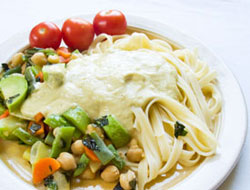
Vegetarian Protein - Myths and Facts
Part 5: Beyond Protein - Adopting a Plant Based Diet
A balanced, varied diet of whole plant foods has ample protein, making animal products (milk, cheese, and eggs as well as meat, fish, and poultry) unnecessary to get enough protein.
More Info On Plant Protein SourcesOmnivore diets aren't ideal for our health, for the environment, or the animals who 'give' us their eggs, milk, and flesh.
Many vegans feel strongly that vegan diet is the only ethical solution. However, a well balanced vegetarian or near-vegetarian diet is a vast improvement over the typical North American meat centered diet.
Many prefer a gradual transition to a completely plant based diet. Ovo-lacto or lacto vegetarians feel that a small amount of animal protein from eggs or dairy provides a margin of safety in their diets, and allows them to blend in socially, while relieving stress on the environment.
Even if most people didn't become vegetarian, but gave up eating red meat, cut their consumption of fish and chicken by 50 - 75%, and introduced more grains beans and veggies, it would make a huge difference to life on planet earth. Factory farms would go out of business.
There'd be no need to cut down the rain forests, or any forests, for grazing land. All the land devoted to crops grown for animal consumption could be converted to organic farms supplying local needs. Which would improve our health and save fossil fuels, etc.
Any step in the direction of a balanced diet consisting primarily of grains, vegetables, fruits and legumes is cause for celebration, and deserves our encouragement and support.
Food Isn't Science
Protein is important, but on a vegetarian diet, all the food you eat works together to nourish you. The practice of separating foods into three groups - protein, fats, carbohydrates - and counting the grams you eat, plus calories, is a recent, uniquely western idea, which limits our diets unnecessarily, and keeps us from enjoying our food.
'Science of nutrition' is an oxymoron! I thought about adding some vegetarian protein charts to this article, with amino acid breakdowns, but that seemed complicated.
Much of the information in this article came from book length scientific abstracts published by universities and government agencies. Reading them is enough to make you go blind and around the bend - referencing them likewise. So I didn't - please forgive me.
For those of you who want more science, I recommend a series of excellent books by Vesanto Melina and Brenda Davis: The New Becoming Vegetarian, Becoming Vegan, and Becoming Raw. These books are compassionate, user-friendly, well written, clearly organized and referenced - vegetarian nutrition bibles which all vegetarians should own and learn by heart!





